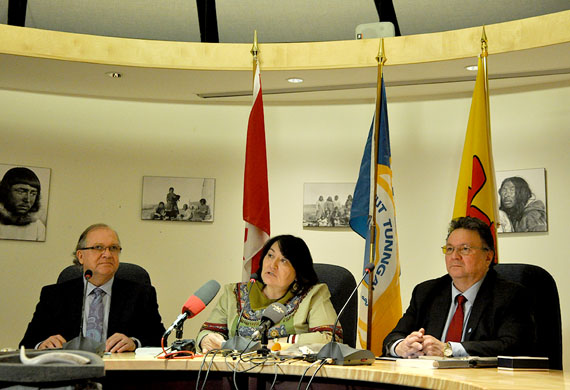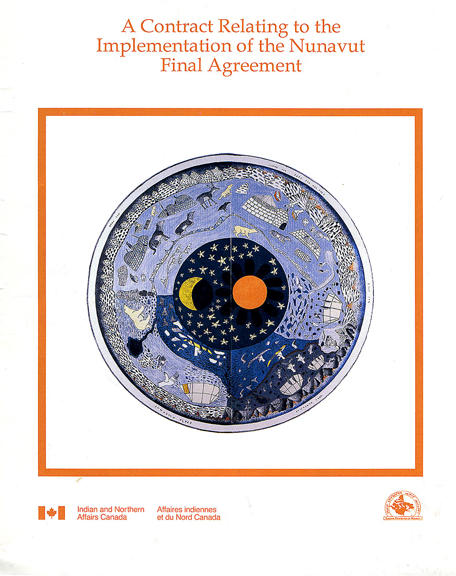Ottawa settles with Nunavut Inuit, pays $255.5M in compensation
$175 million will go to Inuit training, while NTI will invest remaining $80.5 million

Bernard Valcourt, the minister of Aboriginal Affairs and Northern Development Canada, Cathy Towtongie, president of Nunavut Tunngavik Inc., and Peter Taptuna, premier of Nunavut, at the signing ceremony for a big out-of-court settlement agreement that resolves a lawsuit that NTI filed against Ottawa in December 2006. Ottawa will pay NTI $255.5 million in compensation. Of that, NTI will spend $175 million on training and education for Inuit. NTI will invest the remaining $80.5 million. (PHOTO BY THOMAS ROHNER)

Here’s the front cover of the 1993-2003 implementation contract for the NLCA that expired in 2003 and was never renewed after negotiators from NTI and the federal government could not resolve major disputes over issues like Inuit training under Article 23, the Nunavut Arbitration Panel, and funding for institutions of public government, like the Nunavut Impact Review Board.
(Updated May 4, 1:40 p.m.)
The federal government will spend $255.5 million to compensate Nunavut Inuit as part of an out-of-court settlement that resolves a nine-year-old, $1 billion lawsuit that Nunavut Tunngavik Inc. filed in December 2006.
Of that, $175 million will go towards employment training for Inuit, NTI said May 4. NTI will invest the remaining $80.5 million.
“NTI hopes that this settlement agreement will open a new chapter in our relationship with the Government of Canada and the GN, and that Inuit will be able to further take advantage of the promises contained in the NLCA,” Cathy Towtongie, the president of NTI, said May 4 at a signing ceremony for the settlement agreement held in Iqaluit.
NTI first announced the settlement agreement March 9, just before a big trial on the issue was set to start at the Nunavut Court of Justice.
Bernard Valcourt, the minister of Aboriginal Affairs and Northern Development, said when the government of the day failed to renew a 10-year implementation contract for the land claims agreement that took effect in 2003, they “dropped the ball.”
The governments in power in Ottawa for most of the years leading up to the dispute were run by Liberal prime ministers Jean Chrétien and Paul Martin.
But Valcourt said the settlement deal represents a “significant step forward” in the relationship between the federal government and the Inuit of Nunavut.
“It is a pleasure to participate this morning in today’s event and to sign on behalf of our Conservative government an agreement with NTI and the GN that will ultimately result in more opportunities and growth in Nunavut,” Valcourt said.
The May 4 signing follows ratification of the deal by NTI, Canada and the Government of Nunavut.
To manage the $175 million in training money, NTI will create an entity called the Nunavut Inuit Training Corp., to be overseen by a seven-member board.
NTI will appoint five members to the new corporation’s board, while the Government of Nunavut will appoint two.
They will also use an expert advisory council made up of representatives from Canada, the GN and NTI.
And on top of the $255.5 million, Canada will spend an extra $50 million over the next eight years to pay for training programs for Inuit in relation to Article 23.
To fulfill another NLCA obligation related to Article 23, Ottawa will complete a new Nunavut Inuit Labour Force Analysis in conjunction with NTI and the Nunavut government.
Ottawa will pay for that effort outside of the $255.5 million in compensation funds.
And Canada and the GN will each establish a central Inuit employment and training office.
Details of the agreement emerged following an Iqaluit news conference attended by representatives of the three parties involved in the legal action: federal Aboriginal Affairs Minister, Bernard Valcourt, Towtongie and Nunavut Premier Peter Taptuna.
The deal, which also includes previously announced funding increases for Nunavut’s institutions of public government, such as the Nunavut Impact Review Board, creates a new dispute-resolution system that replaces Article 38 of the NLCA.
Under the new system, implementation disputes would be handled in stages and allow for mediation and arbitration following discussion of the dispute by the Nunavut Arbitration Board.
On arbitration, NTI won a major concession: they may now refer disputes to arbitration without the consent of the governments of Canada or Nunavut.
For its contracting and procurement obligations under Article 24, Ottawa promises to sit down with NTI to develop a mandatory, Nunavut-specific federal contracting policy no later than July 2016.
The settlement agreement, reached out of court, brings an immediate end to a protracted dispute that dates to the early 2000s and also heads off a long, expensive trial that had been scheduled to start at the Nunavut Court of Justice this past March.
Taptuna said he’s happy with the new money that will help the Government of Nunavut train and hire more Inuit.
“We are pleased the settlement has been finalized, and are committed to working with NTI in advancing initiatives that further support training of Inuit within the GN Public Service, as outlined in Article 23 of the NLCA,” Taptuna said.
Major parts of NTI’s lawsuit, filed Dec. 5, 2006, alleged the federal government breached the Nunavut Land Claims Agreement and breached the Crown’s fiduciary obligations to Nunavut Inuit by failing to carry out Article 23 of the agreement.
Article 23 is the section of the NLCA that says governments must do certain things, such as affirmative action programs, to help Inuit get government jobs.
And Article 23 says those measures must stay in place until the proportion of Inuit working for government is equal to the proportion of Inuit living in Nunavut — currently about 85 per cent.
Between 1993 and 1999, the federal government spent about $39.5 million to help prepare Inuit for government jobs.
But NTI alleged in its lawsuit that all such spending came to a halt on April 1, 1999, the day the Nunavut territory came into being.
“The Crown’s initiatives since April 1, 1999, have been wholly inadequate to meet its obligations under Article 23…” NTI said in 2006.
Talks between Ottawa and NTI, aimed at creating a new implementation contract for the NLCA, broke down in 2005, partly because of the dispute over Article 23, leading directly to the December 2006 lawsuit.
The next renewal of the implementation contract will take effect on April 1, 2023.
But it will not be renewed for the period between 2013 and 2023.
Ottawa must make its best efforts to pay the compensation money within 45 days of the settlement agreement’s signing, and no later than 75 days after the signing date.
(With files from Thomas Rohner)





(0) Comments